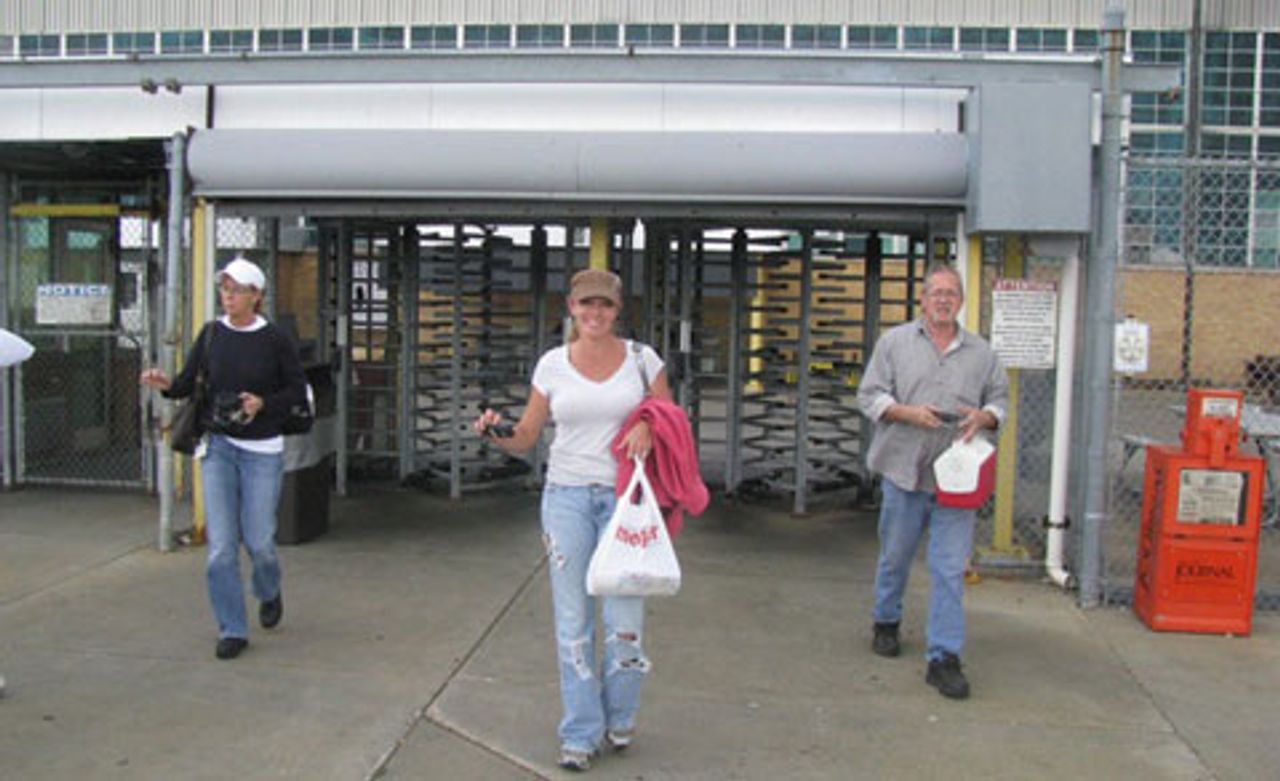There is widespread hostility among workers toward the new four-year labor agreement accepted by the United Auto Workers (UAW) for 49,000 hourly workers at General Motors.
 Workers on shift change at Flint Metal Center
Workers on shift change at Flint Metal CenterSeveral Internet sites and Facebook pages are filled with angry posts from workers denouncing the contract, and the news media is speculating on whether the UAW will be able to “sell” the deal to its membership.
Voting on the contract began Thursday with Truck Assembly workers in the industrial city of Flint, Michigan. Ratification meetings are being held over the next several days in Michigan, Ohio, Indiana, Missouri, Kentucky, Tennessee, Louisiana, Texas, New York and other states.
Workers are particularly angered because the number one US automaker is making billions in profits but has rejected any wage and benefit improvements. Workers have gone without a raise since 2003 and have lost up to $30,000 each in concessions over the last five years alone, including the wage cuts demanded by the Obama administration during the 2009 restructuring of GM and Chrysler.
“They bailed out the auto industry. We paid it back while Wall Street didn’t pay a penny,” a worker from the GM Powertrain factory in the Detroit suburb of Warren told the WSWS. “All the banks did was throw expensive parties. For us, all they are saying is cut, cut, cut!”
Pointing to the expansion of the two-tier wage system, which condemns new hires to substandard wages and benefits, he said, “How can someone raise a family on $19 an hour? We’ve been talking about this in the plant, how can you start a family or afford a new car? That’s why I’m driving a ’98.
“What GM took from us, they should give back,” he concluded.
The UAW has abandoned hourly wage increases and replaced them with bogus profit sharing schemes tied to the profitability of the company. “The Detroit Three automakers have welcomed this approach because it means they only have to pay workers more when they are making money and can dial back compensation when times are tougher,” the Detroit News declared. “The profit-sharing bonus also does not add to workers' base earnings for the purposes of pensions, making it far less costly for the automakers in the long run.”
While the UAW has earned the praise of the corporate executives and media, it has only gained more contempt from rank-and-file autoworkers. “The UAW is a big business,” one worker said, while another said it was only interested in defending the multi-million dollar golf course and “training center” for UAW bureaucrats in Black Lake, Michigan
 Cecil
CecilCecil Ward, a Flint Metal worker with 36 years in the auto plants, was angry that the contract does not restore any of the cuts sacrificed by retirees in the 2009 contract. “They shouldn’t have taken anything away from the retirees to begin with. They took away their vision, their dental. They took away their $600 Christmas bonus. That should have been reinstated.
“The retirees pay $2 a month in union dues but the UAW says they can’t bargain for them. Why aren’t they representing the retirees? The union is just playing right along with them. They should have got back to the retirees what they gave up.”
Referring to the 1936 sit-down strike in Flint that established the UAW in the face of bitter opposition from GM, a woman who worked 30 years at the company, said, “The sit-downers would be turning over in their graves. Every day in the plant we say the UAW is nothing but a business.”
She pointed to experiences in Lake Orion and Bay City, Michigan where the UAW forced workers to accept massive wage cuts, and at Indianapolis where the plant was closed after workers refused major concessions. “You’re all going to get $18 an hour,” they said, “or you’ve got to retire now.” “But how are people going to leave in this economy?
“What legacy are we leaving our kids and grandkids? One of my sons is only making $11.50 an hour working at what used to be American Axle. I have to help him out. I’ve seen pictures of Chinese workers in ungodly and unsafe conditions. Is that going to happen here?
“I’ve been thinking, a revolution is coming to this country. We all talk about it in the plant. It’s not just GM--it’s the government. People are losing their jobs, their homes. There’s going to be a revolution.”
Richard Newsom , a worker with 42 years in the auto plants said, “They shouldn’t be taking anything from the retirees. That’s who we should be fighting for. I worry about the VEBA (the union-controlled retiree health care trust) too. All the rest of them failed, I don’t see why ours won’t. The company loved to dump that off on the union. Divide and conquer.”
“They have a lot of tier two workers here. My daughter got in. They gave us preferential hiring. She is low wage. She is on third and I am on second. It’s not right. There is nothing we can do to stop it, unless there is a revolution.”
 Walt
WaltWalt Brockway, a worker with 36 years, said, “I was going to retire but I can’t. My wife has got cancer. I need the money. I was looking at the contract. The $25 per (doctor) visit--that is going to keep me here--plus the fact they are only giving production workers $10,000 to retire. That is a slap in the face. They wonder why we are pissed.
“They are trying to drop wages all the way across the board across the country. I think the UAW is selling out. I am going over tomorrow and voting no on the contract. I don’t care about that $5,000 signing bonus. They can kiss my butt, I am voting no.”
The contract also sanctions the continued use of thousands of low-paid temporary workers, so-called flex-workers and contractors who have no rights at all but are still compelled to pay dues to the UAW.
A young worker who works for a sanitation contractor at the metal factory said, “We only have about one-fifth the number of workers we need to do the work. Our jobs used to be done by GM workers. It’s the same work but we’re wearing a different uniform and making $14.88 an hour, half the wages of the guys in there. It’s also easier to kick us around. UAW Local 659 is supposed to represent us—but they don’t do anything.”
“Where’s all the money in the union strike fund?” asked a Powertrain worker in Warren. “They said we would never have to worry about the VEBA. Now they want us to pay 10 percent from our profit sharing to keep it solvent. As for the two-tier wages, I have two sons, why should they work for $15 an hour?”
Supporters of the Socialist Equality Party distributed a statement calling for a rejection of the contract and the formation of rank-and-file committees, independent of the UAW, to fight for the full industrial and political mobilization of auto workers to abolish the two-tier system and restore all wage and benefit concessions. (See: http://wsws.org/articles/2011/sep2011/auto-s20.shtml).
At an afternoon informational meeting at the UAW Local 598 union hall many Flint Truck Assembly workers said they were voting down the contract. Some were doing so out of principle, saying they would never again vote for a contract endorsed by the UAW.
Outside the hall UAW local officials screamed threats at the SEP supporters and called the police in a failed attempt to stop them from distributing the statement.
Flint, once the home of 100,000 GM workers, has been decimated by decades of plant closings and mass layoffs, aided and abetted by the UAW. Today, less than 5,000 GM workers are employed in the city that is littered with abandoned factories, foreclosed homes and decaying public schools.
 Judy and Murney Bell
Judy and Murney BellAt the Capitol Coney restaurant on the corner of Bristol and Van Slyke we met Murney and Judy Bell. Murney was a millwright at GM’s now closed Pontiac Motors for 20 years. He is also a retired ironworker. Judy, his wife, is a state worker. They described conditions in the Flint area.
“In North Branch, perfectly good houses are selling for $10-15,000,” Judy said. “My dad’s house is selling for $500 more than what he bought it for in 1974 even though he made lots of improvements. It’s been on the market for three-and-a-half years.
“It’s like the Depression. Back then my granddad was in Tacoma, Washington and he got a call that AC Sparkplug was hiring. He didn’t have a car so he hopped on a freight train to come back to Flint. After the war, things picked up and in the 1970s, we weren’t rich, but you could make it with just one income in the family.”
“The kids today are never going to be able to make any money,” Murney said. “Almost everything around here has been shut down—Buick City, AC, Chevy in the Hole, Fisher Body. As a millwright, I moved machinery out of every one of those factories—it was sorrowful. I knew no one was ever going to work in them again. We were never laid off, there was no end to that kind of work and they’re probably still doing it.”
Referring to the smashing of the 1981 air traffic controllers’ strike, Murney said, “It all began with Reagan when he fired the controllers. The unions let those workers down. If they jumped in with a national strike that would have stopped it there—the unions were very strong then. If there was a non-union job being put up, ironworkers would come in and tear it down. Now they would throw you in jail for life. As for the unions, they are totally business-oriented.
“Today,” he said, grasping his two hands together tightly, “This is the unions and management.”
